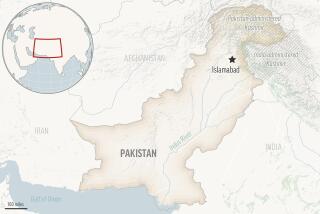Malaria Outbreak Feared in Eastern Afghanistan
- Share via
GENEVA — The U.N. health agency said Tuesday that it fears there may be an outbreak of a deadly form of malaria in eastern Afghanistan.
There have been an increased number of cases of falciparum malaria--one of the most dangerous forms of the disease because it can infect the brain--said Gregory Hartl, spokesman for the World Health Organization.
Though no outbreak has yet been confirmed, “there are higher numbers than usual compared with last year,” said Loretta Hieber-Girardet of the group’s emergency and humanitarian unit.
October-November typically is the seasonal high point for malaria in the region, Hartl said. The cases have been found in Nangarhar province near the eastern city of Jalalabad, he said.
The health agency has been sending anti-malarial supplies to two hospitals in Jalalabad. Hieber-Girardet said it appears there is sufficient medicine on hand unless there is a widespread outbreak.
Hartl said 269 children were hospitalized in September in the pediatric ward of Jalalabad Public Health Hospital, more than half with serious conditions, including malaria of the brain. Patients have already died of malaria in Jalalabad.
There has been no notable outbreak of major disease among the refugee population in Pakistan since the U.S.-led airstrikes on Afghanistan began Oct. 7, Hartl said.
A report on a survey of the prevalence of malaria is expected in two or three days, Hartl said.
Worldwide, malaria kills more people than any other communicable disease except tuberculosis. It is spread by mosquitoes, and victims suffer fever, shivering, joint pain, convulsions and coma.
The World Health Organization estimates that malaria infects more than 300 million people a year and kills 1 million. Most who die are African children under age 5.
Afghanistan has 450,000 cases a year, mainly in the rice-growing northern and eastern parts of the country, the agency said.
More to Read
Sign up for Essential California
The most important California stories and recommendations in your inbox every morning.
You may occasionally receive promotional content from the Los Angeles Times.










